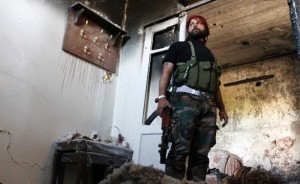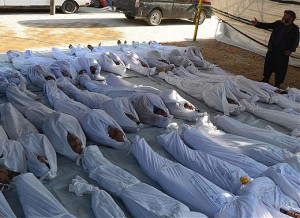THE EXPERIENCE
Jun 21st, 2013 by amcadams
We will look at 10 different expressions of Hell in this seminar. I could have identified even more of them. These will suffice to give you a sense for the importance of “description.” As we shall see throughout this seminar, it matters that one word can have 10 different meanings. In the coming weeks, I will challenge you to think about what it means to read, write, speak, and argue effectively. No one is born with these skills. You need to acquire them the old-fashioned way—by working on them.
Devour all of the readings below. In addition to the required books, please remember to bring all of the readings marked “print” to each class.
1. Tuesday, August 27:
Discussion Topic: Why is Hell a significant part of our daily lives?
- I elaborate on my goals in this course.
- I outline the structure of the course.
- I administer a class survey.
IMAGE ONE
WORLD WAR I: “WAR IS HELL . . .”
2. Thursday, August 29.
DiscussionTopic: What is Hell? It depends on whom you ask. Can the Catholic Church and Erich Maria Remarque expect to get along?
The goal today is to start familiarizing ourselves with the terrain of Hell. Everything that we do now will relate to what we do in other parts of the course. Imagine yourself as a collector, picking up two versions of Hell and trying to discern what they are about. Remarque presents us with the first image of Hell in the Twentieth Century—World War I. What is war and what does it do to us?
- “Hell” according to the Catechism of the Catholic Church: PRINT AND READ
- Erich Maria Remarque, All Quiet on the Western Front (chapters 1-6
Recurrent Semester Theme: “The Significance of Syria”
- READ: Syria: A Problem from Hell.
 Also on war: Medal of Honor and PTSD?
Also on war: Medal of Honor and PTSD?
Assignment for Tuesday: Please write a four sentence paragraph on the topic: “Remarque’s argument is…”
3. Tuesday, September 3.
Discussion Topic:
- Finish reading Erich Maria Remarque, All Quiet on the Western Front
- Lewis Milestone, “All Quiet on the Western Front.” I will show a short segment of the film in class. I will use the scene in which Paul Baümer finds himself face-to-face with his “enemy” in the trench. Prepare for this Oscar Award-winning film by reading HERE
4. Thursday, September 5.
Discussion: Great Writing, Persuasive Criticism
George Orwell is one of the best stylists in the English language. His works are deceptively easy to read. Most people cannot write like this. I want you to try.
Readings from George Orwell:
- “Why I write” PRINT AND READ
- George Orwell writes: Facsimile of p. 1 of Brave New World (handout)
- Mystery Facsimile (handout)
- “Politics and the English Language” PRINT AND READ
- “Review of Sartre” PRINT AND READ
5. Tuesday, September 10.
An Excursus into the past. From the Twentieth Century to the Fourteenth Century and back. Our goal in today’s meeting is to understand how different depictions of Hell reflect the period and the circumstances in which they are created.
We will meet in the Special Collections Room of Hesburgh Library. Notre Dame is a powerhouse in Italian studies and has one of the finest collections of Dante’s Divine Comedy. Tracy Bergstrom, the library’s expert on this collection, will introduce us to visual depictions of Dante’s Inferno.
Before we meet, read the following three Cantos closely. The better you understand these Cantos, the easier it will be for you to interpret the artistic depictions we see. For background, read through the short section from Turner’s History of Hell and browse the Dante site.
- Canto 1 (PRINT AND READ); Canto 3 (PRINT AND READ); and Canto 33 (PRINT AND READ)
- Background Reading: Alice Turner, The History of Hell: READ
- One of many illuminating Dante sites: BROWSE
IMAGE TWO
THE HOLOCAUST: “A LIVING HELL . . .
6. Thursday, September 12.
Discussion: What is Wiesel’s depiction of Hell? And how does his portrayal of the Holocaust differ from those of Remarque and Dante?
- Read the first half of Elie Wiesel, Night
Recurrent Semester Theme: “The Significance of Syria” 
- Is Obama speaking the same language as Congress? PRINT AND READ
7. Tuesday, September 17.
Discussion: Based upon your reading of Night and the Nobel Lecture below, how would Wiesel expect us to respond to manifestations of Hell on Earth? What would President Obama say? How would either Wiesel’s or Obama’s response differ from the views of the other authors we’ve considered (or will consider)? For that matter, what would Jesus say? What would Jesus do?
- Complete your reading of Elie Wiesel, Night
- Elie Wiesel, “Hope, Despair, and Memory,” Nobel Lecture, December 11, 1986 PRINT AND READ
8. Thursday, September 19.
First Great Debate: “Radical evil must be combatted wherever and whenever it occurs!”
Debate structure:
At the beginning of class, each side will have 10 minutes to prepare its case. Then the class will meet in full. The side in defense of the proposition (“pro”) goes first. It has 10 minutes. Then, “con” rebuts the proposition. It has 10 minutes.
Both sides will have 8 minutes to prepare their rebuttals.
The class will then reassemble in full. “Pro” will have 8 minutes to restate its case. “Con” will then get 5 minutes, or perhaps less depending on “pro’s” ability to restrain itself.
Rules:
- Everyone must participate.
- Be succinct. No speeches.
- Take notes to identify your opponents’ positions.
- Argue. Disagree. Show emotion. Be electric!
Note: This is a debate! Not a tea party. Here is an example of a debate: Kantian Epistemology Be prepared to fight and win, but please leave your weapons at the door!
9. Tuesday, September 24.
Discussion: More Great Writing
- In-class Film: Selections from Leni Riefenstahl’s phantasmagoria, “Triumph of the Will” READ
IMAGE THREE
LIFE ITSELF: “LIFE IS HELL . . .”
10. Thursday, September 26.
Existentialism, Version I: “A World Without God”
- Jean-Paul Sartre, “The Wall” (HAND-OUT)
11. Tuesday, October 1.
Existentialism, Version II: “A World With God”
- Flannery O’Connor, “The Lame Shall Enter First” (HAND-OUT)
ω
OMG: Please leave your technology at home. This includes electronic devices of any kind, such as laptops, i-Pads, i-Pads2, FBI trap-and-trace tools, cell phones, Kindles, video cameras, or other personal digital devices.